Loiter: East Cleveland Fights for Food Power in a Harsh Climate
How one organization is growing self-determination and food justice amid a barren landscape for Black-owned businesses.
Loiter: East Cleveland Fights for Food Power in a Harsh Climate
How one organization is growing self-determination and food justice amid a barren landscape for Black-owned businesses.

Ismail Samad stands outside Loiter in East Cleveland, Ohio. Photo courtesy of Loiter
Ismail Samad is no stranger to hospitality. The East Cleveland, Ohio, native began his first foray into restaurant co-ownership at the age of 23, and in 20 years, he has worked his way through ground-breaking restaurant openings and community programs. Working at the intersection of food and community crystallized a realization for Samad: Black and POC food systems are in a chokehold. He’s collaborated with some of the nation’s foremost food justice leaders to empower freedom.
His hometown of East Cleveland is now his focal point. While 89 percent of East Cleveland residents are Black, and 40 percent of them live in poverty, millions in purchasing dollars still leak into outsiders’ business interests. Further, within the small community sit over 500 vacant properties—indicating a ripe opportunity for self-sustaining growth.
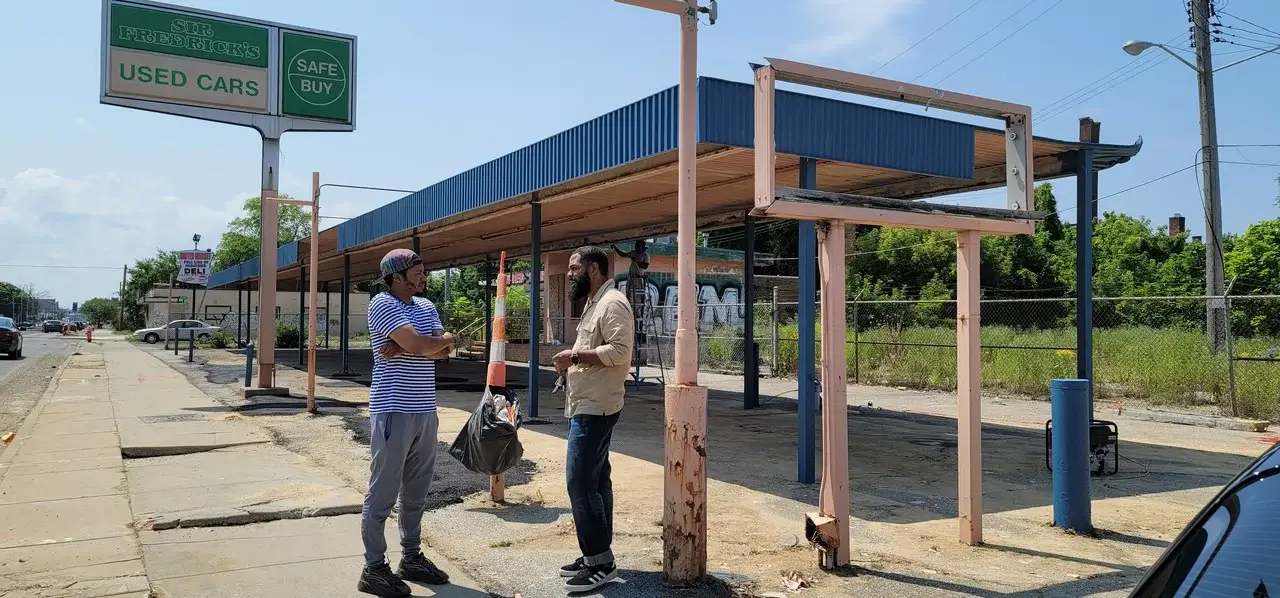
“East Cleveland—it’s three-and-a-half square miles. It’s not a neighborhood of Cleveland, it’s its own municipality. There’s a fire department, police department, but within the city there is no grocery store, right? There is just no space of gathering that’s an intergenerational space that’s not fast food or a bar, you know? For me as a chef from the city, I want to come and bring some things that we deserve in our communities,” says Samad. And with that desire, Loiter was born.
“People need places to hang out,” says Samad, “and you can’t hang out in our communities without looking like criminals, so, therefore, the only folks allowed to build our communities back are folks who are not current residents. The recipe is very clear.”
Samad serves as Loiter’s chief equity officer and co-owns the nonprofit with his sister Alima Samad—a seasoned business growth consultant—who leads entrepreneurship and organizational development. They created Loiter to fill the gaping void of holistic, soul-nourishing Black hospitality spaces, among the few left by a glaring lack of development support and antagonistic regulatory environment.
During the project’s design phase, community members provided input and research was conducted with the Harvard Law School Food and Law Policy Clinic. They identified strategies for profit-generating, community food systems in East Cleveland with an eye on “increasing the power and financial well-being of residents.”
Learn More
Read the Report: Food Sovereignty & Food Production in East Cleveland
Along those lines, Loiter’s mission is to “confront the effects of systemic racism and encourage the intentional re-investment needed to build successful community-owned enterprises.”
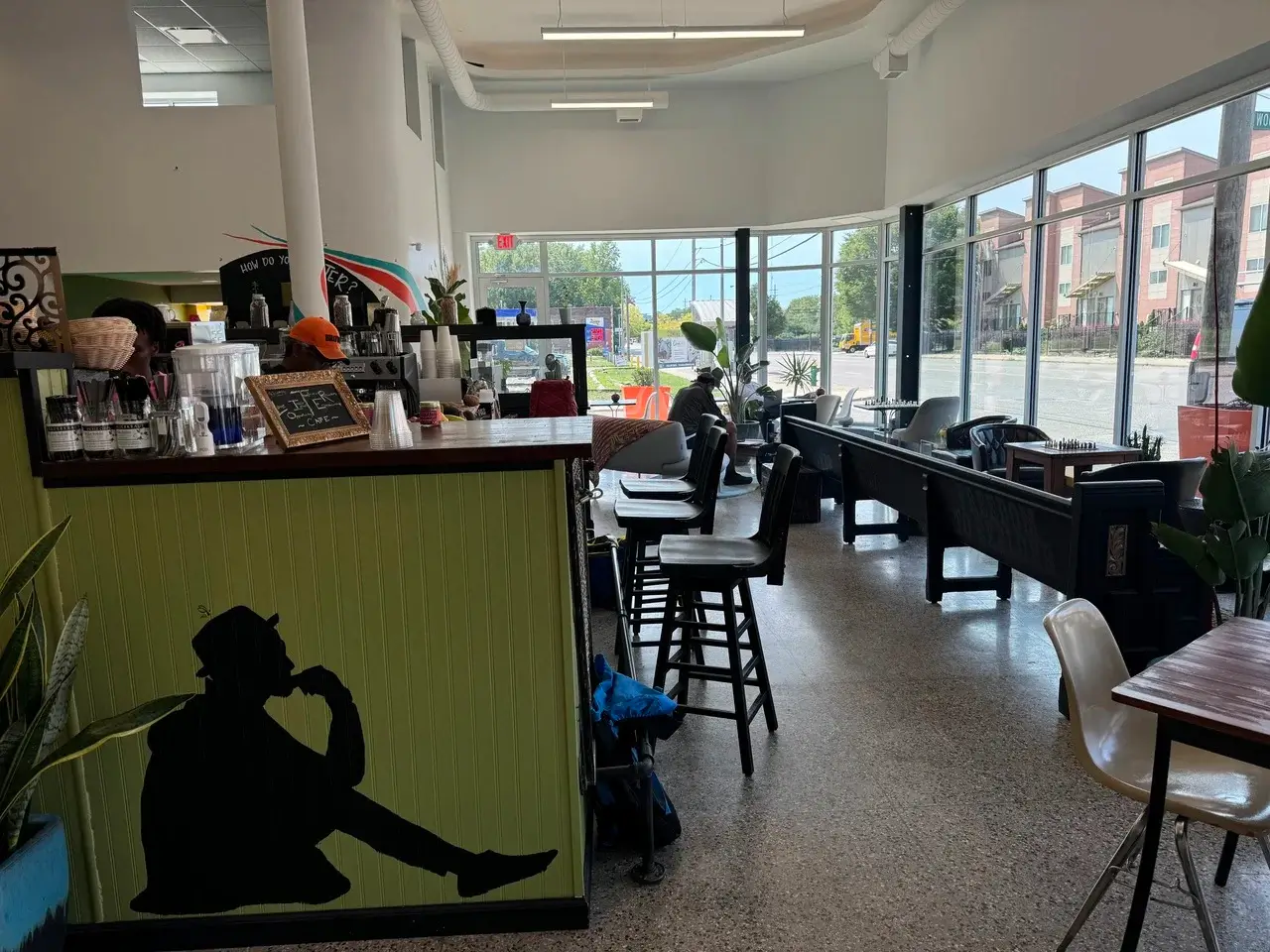
To do so, Loiter powers an ecosystem of businesses: a cafe and micro-market, an affirmative foods company, and a Black business incubator, among others. The organization purchases from, employs, houses, and empowers Black and BIPOC makers—primarily from the East Cleveland area. Each component of the Loiter model nourishes the community. The heart of the operation is a high-quality food hub and cafe. The cafe sources baked goods from local, mom-n-pop operations and BIPOC East Cleveland residents.
Coffee, tea, honey, and chocolate are either grown, processed, or produced by local Black businesses, POC collaboratives, or urban farms. Even the ice cream is locally Black-owned—by Ibrahim Colvin of Colvin’s Sweet Cremery. It features cultural flavors such as sweet potato pie ice cream (sourcing pie from Shareef’s Pie in the Sky), a vanilla “bean pie” flavor, and a red velvet cake flavor.
Building Black Control of Their Food System
To foster a self-controlled food system, Loiter works through Wake Robin—its affirmative fermented foods company acquired in 2013—to purchase from local Black growers. “They’re growing our tea purchased from a Black woman who is also roasting our coffee. The chocolate [for Loiter’s Chocolate Rebellion] comes from the Cross Atlantic Chocolate Collective,” explains Samad. It also plans an opening of the Chocolate Farmhouse, slated for this winter.
This approach isn’t just about sustainability, but self-determination, says Samad. “So, you can make an argument [that] the most sustainable cafe is in the poorest city in the state. How did that happen? Well, because we rallied behind injustice and created environmental justice solutions that are led by us.”
“The solution I would like to see is that we band together and create the narrative necessary for our people of color. We are not here to look for someone to save us. We are here to save each other.” — Mikki Smith of African Land Collective
Ultimately, Loiter creates a self-sufficient cycle of building and scaling small businesses—which creates Main Street-level retail shops in an incubator fashion—from startup to grand opening. Loiter helps them scale and grow into their own storefronts, with services such as business advising and technical assistance.
Loiter’s name is multi-layered: meaning Love-Opportunity-Investment-Transformation-Equity-Reparations/Restitutions-Now(!). It represents the self-described ”freedom to explore without fear, gather together, and reclaim our space,” and challenges notions of loitering—labeled as an offense when a person lingers in an area for no apparent reason—historically targeting the Black community.
Samad categorizes loitering laws as the criminalization of innocent social behavior, which demonizes the most sedate forms of Black relaxation—associating and eating together. To the Samad siblings, “loitering” simply means dwelling in a sense of neighborhood safety and belonging, and that’s what their organization represents, too.
Read More
Living While Black and the Criminalization of Blackness from Vox.
“People need places to hang out,” says Samad, “and you can’t hang out in our communities without looking like criminals, so, therefore, the only folks allowed to build our communities back are folks who are not current residents. The recipe is very clear.”
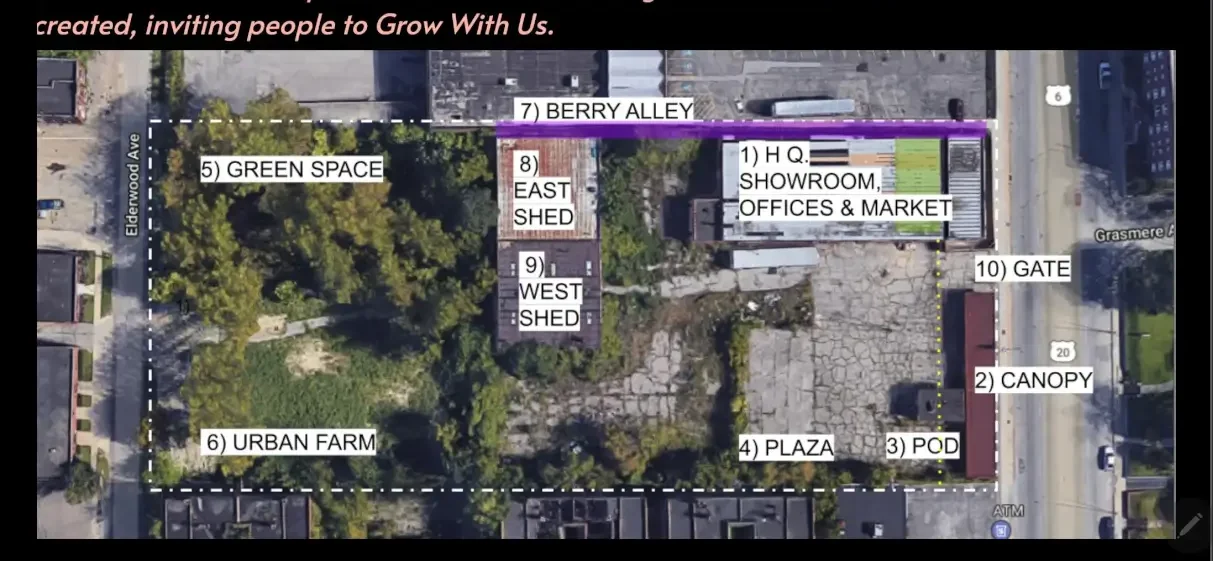
Despite the clear community support, Loiter’s emergence wasn’t without strife. The new cafe and market are housed in a renovated building that is part of the larger Circle East development in East Cleveland—a five-phase, 30-acre, and estimated $122-million commercial development project owned by Cuyahoga Land Bank.
The land bank leveraged the Samads’ decades-long, sterling reputations as area natives to win resident approval, and acquired millions in funding due to its association with the development. But, in late spring of 2024, Loiter had its sign removed and was unceremoniously locked out of its space by Cuyahoga Land Bank, which intended to terminate Loiter’s lease.
Cuyahoga Land Bank claims Loiter violated their agreement by installing commonly floor-bolted commercial furniture during the cafe buildout phase prior to opening, claimed issues with electricity, requested Loiter change its name to better align with the development’s “vision,” and opposed signage installation.
To the community, this had all the hallmarks of a bad-faith effort to use the Samads’ clout and promise of Black-led community rehabilitation to secure millions in funding, only to turn its back on Loiter once the Samads were no longer needed.
Despite Cuyahoga Land Bank’s efforts to evict Loiter and flip the property, the Samads were not cowed. If anything, the conflict underscored the community’s ongoing need for a space like Loiter.
And the Samads put their money where their intentions are. They invested more than $150,000 and aim to remain as a fixture, creating citizen entrepreneurship opportunities, providing financial education and mutual support. To protect their investment, they fought back in the courts.
Loiter filed suit against Cuyahoga Land Bank on June 20, claiming delays on the developer’s part with operational basics such as electrical access and water sub-metering. The developer countersued, and the legal battle continues. On July 11, Loiter was granted an injunction, which allowed it to successfully open in the space and ordered Cuyahoga Land Bank to replace its signage.
Samad was perplexed and disappointed that things devolved to an antagonistic legal battle instead of respectful and constructive face-to-face communication with Cuyahoga Land Bank.
“Even though we’re open, we still have to deal with the realities of the community feeling like our needs and our voices were not heard, and that we had to go through the process in a legal system instead of being able to talk with one another—to have a real conversation about how we can move forward, right? What can we do together? So, we still have not had that conversation with them. So, we are open. But we still have to deal with that conversation around what does this all mean?”
Nevertheless, Loiter and its community stakeholders are optimistic that the pending sale of the renovated property to a biotech company holds a fresh start to collaborate with new ownership. The prospective buyers plan significant property investments, including the construction of a laboratory and co-working space.
“We are looking forward to seeing who the new buyer is, and if we can restart the conversation with the new owner to see how community voices can be present in development efforts from people prospecting in the city,” says Samad.
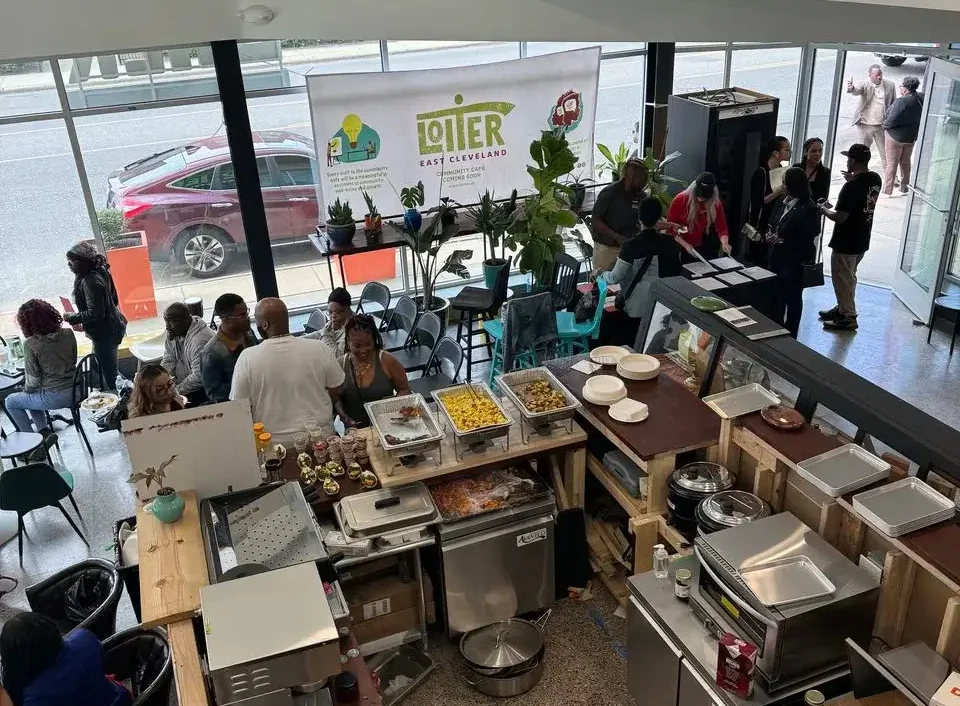
Despite the setbacks, Loiter is now fully operational. They had their soft opening by August 10, within the court-mandated deadline. Their grand opening was held September 28, and they are open regular hours Tuesday to Saturday 8am to 6pm. “We’re excited about our ecosystem having a platform, being a critical space in the city. And a lot of our makers and growers and producers are really excited to sell their produce, and have it go into products being made throughout the whole system and having the cafe featuring them. So, we’re excited to show what the collective is trying to do,” says Samad.
The Samads’ dream for Loiter expands beyond the building walls to additional initiatives. “It’s the whole integrated thing,” says Samad. “You can’t build a community just by saying you need a grocery store, right? You can’t fix these policies that set up food deserts and food swamps and create apartheid realities just by addressing food access.You have to fix the environmental needs, too.”
So, the Samads set out to address poverty. In 2021, on a 3.5-acre long-abandoned car lot they created the Euclid Avenue Farmer’s Market, a bustling center of produce stands, food trucks, and pop-up markets. The farmers and vendors now align their capacity with Loiter’s cafe and market—providing them consistent and stable income through that retail access.
The Political and Economic Climate
Access is really the issue. Jennifer Lumpkin, an environmental justice advocate and founder of My Grow Connect, works with food policy and is a Loiter farmers market supplier. Lumpkin spoke about the political climate in which community members live.
“One must understand the political ineptitude that exists in East Cleveland, exacerbated by the lack of financial resources, means and ways to remediate the ills of food apartheid, environmental and social injustice,” she says.
Lumpkin and other food justice leaders maintain that critical attention to systemic issues undermining Black ownership of their own consumer economy is long overdue.
“Land acquisition, stewardship, or lease in any of Cuyahoga county’s vacant or abandoned properties are unavailable and owned by the municipality. Or the process by which to apply, meet the criteria, and actually own land is reserved for a select and small minority within a minority,” says Lumpkin.
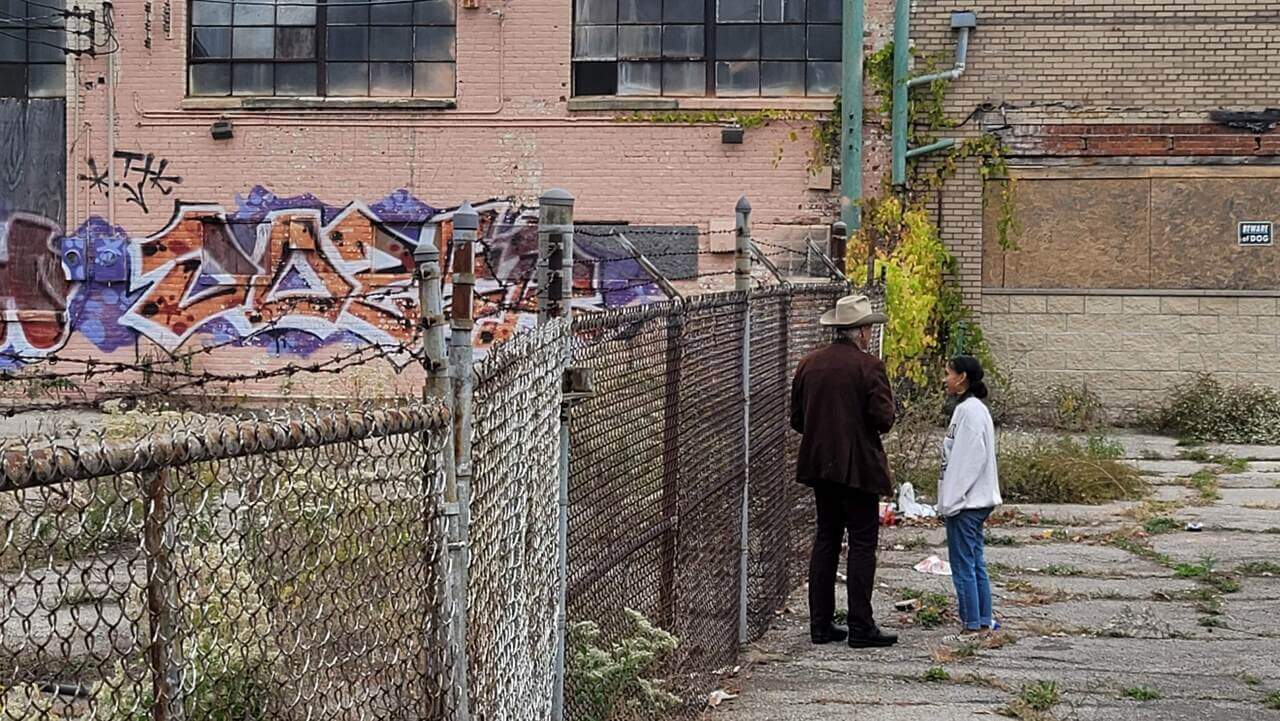
A similar sentiment is voiced by Mikki Smith, a farmer, Cleveland local, and the executive director of Little Africa Food Co-op, a collaboration of urban farms addressing food insecurity at the community level.
“We are the ones that have the most as relates to buying power,” says Smith. “But, we have the least amount of ownership in our community. And that needs to stop.”
Smith understands Loiter’s goals, and she sees food co-operatives with Black ownership as a direct fight against the monopolization of their food system limiting Black economic growth. Redline zoning practices and a litany of civic limitations to what urban farms may grow, how they can grow and fertilize it, and who is allowed to do so produce an overall micro-management effect that harkens backward to sharecropper-era mindsets.
Smith cites programs such as the Summer Sprout classes and Gardening for Greenbacks programs—which restricts entry and dictates seeds provided. They either prohibit produce sales or require a sales contract and downpayment—limiting citizens to either hobbyist gardening or government-controlled foodways, while stifling Black growth and agricultural diversity.
In contrast, Loiter plugs ultra-accessibility into each initiative. Some producers are even offered housing or home improvement potential through Loiter Sanctuary Homes, earning residents additional income from agritourism and short-term rentals.
Motivation and Momentum
Despite the legal setbacks, systemic ills, and harsh political landscape, Samad stays unwaveringly enthusiastic about Loiter’s mission, and he is quick to highlight the contributions of other community members, not just his own. When asked about his childhood in East Cleveland, he was effusive about the neighborhood pride that inspires them, “We had a thriving community that was predominantly Black. Growing up, it was just a beautiful place to be. And then, we went through the same predictable stuff. That’s what happens when you don’t put resources and love into spaces, and when you enact unprincipled policies and ignore the needs of a community. But, that said, it was a beautiful place to exist. Because there were a lot of different communities committed to family and community.”
Among their remarkable traits is their knack for gathering allies and quietly disrupting status-quo food violence—the system blithely segregating, under-educating, bankrupting, sickening and killing communities of color. Although Loiter sits amid deeply entrenched bias, the Samads center solutions—healing through a thriving food economy and promoting city-wide policy changes, such as legalizing composting.
Samad sees Loiter as one step in an overarching strategy of greater resident agency. “Naturally, what we need is investment in our Main Streets and in us, and opportunity to actually own the culture people are moving to enjoy, right? We don’t have to have a dominant culture develop our neighborhoods.”
In order for residents to emerge as empowered community leaders, the latent talent of younger generations requires constructive guidance and education also.
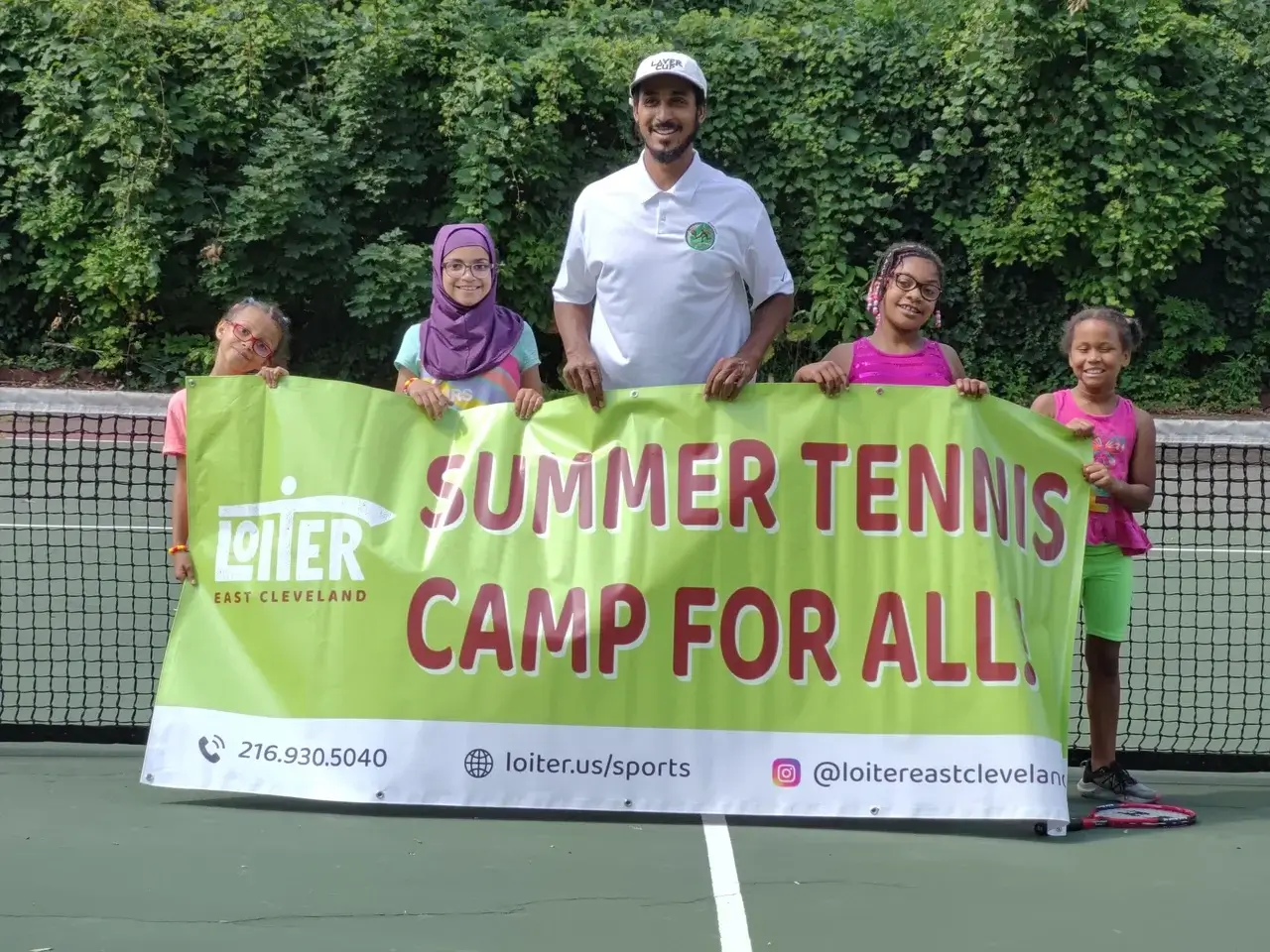
“Our kids need stuff to do, right? Health and wellness go hand in hand. So, we do culinary medicine workshops and teach different sports. Like we did a tennis camp. We did a horseback riding camp a couple of summers ago. This summer, we had Pilates,” says Samad.
This is vital to the “EC pride” that characterized the Samad’s youth, when he recalls neighborhood community clean-ups, support through challenges, and excellent education.
Samad reminisced on the community’s beautiful magnet elementary school. But by middle school, his parents pulled them out for homeschooling, as the school system, parks and recreation, and programming saw increasing divestment to higher tax bracket communities. Their community was drained dry. But this was a microcosm of the national phenomenon of the time.
Those shockwaves resounded countrywide as the Reagan Administration weaponized the federal budget for political agendas, slashing education and infrastructure budgets with an aggressive stance toward “federalism” in public benefits such as education funding, amid vocal bipartisan Congressional resistance. The administration proselytized its war on drugs and increased defense spending. But its domestic tranquility divestment ultimately destabilized the thriving small communities most vulnerable to federal budget cuts.
Against this backdrop, East Cleveland felt the sharp wound of federal impact and urban flight after lackluster state and municipal funding. Yet, an embedded core community persisted to eke out happiness. They shoveled each other’s snow and picked up one another’s trash with a sense of mutual belonging. This caring and self-determination is what Loiter hopes to embody.
Mikki Smith of African Land Collective agrees. “The solution I would like to see is that we band together and create the narrative necessary for our people of color. We are not here to look for someone to save us. We are here to save each other.”
Samad summarizes it best: “We’re trying to put forth a strategy that includes community voice with our assets and celebrates our culture in spaces that are owned by us collaboratively, and that could be building ownership, strategy ownership, IP, narratives. So we have it all within our communities. We just need the opportunity to let that stuff shine.”
Follow us
This work is licensed under a Creative Commons Attribution-NoDerivatives 4.0 International License.
Want to republish a Modern Farmer story?
We are happy for Modern Farmer stories to be shared, and encourage you to republish our articles for your audience. When doing so, we ask that you follow these guidelines:
Please credit us and our writers
For the author byline, please use “Author Name, Modern Farmer.” At the top of our stories, if on the web, please include this text and link: “This story was originally published by Modern Farmer.”
Please make sure to include a link back to either our home page or the article URL.
At the bottom of the story, please include the following text:
“Modern Farmer is a nonprofit initiative dedicated to raising awareness and catalyzing action at the intersection of food, agriculture, and society. Read more at <link>Modern Farmer</link>.”
Use our widget
We’d like to be able to track our stories, so we ask that if you republish our content, you do so using our widget (located on the left hand side of the article). The HTML code has a built-in tracker that tells us the data and domain where the story was published, as well as view counts.
Check the image requirements
It’s your responsibility to confirm you're licensed to republish images in our articles. Some images, such as those from commercial providers, don't allow their images to be republished without permission or payment. Copyright terms are generally listed in the image caption and attribution. You are welcome to omit our images or substitute with your own. Charts and interactive graphics follow the same rules.
Don’t change too much. Or, ask us first.
Articles must be republished in their entirety. It’s okay to change references to time (“today” to “yesterday”) or location (“Iowa City, IA” to “here”). But please keep everything else the same.
If you feel strongly that a more material edit needs to be made, get in touch with us at [email protected]. We’re happy to discuss it with the original author, but we must have prior approval for changes before publication.
Special cases
Extracts. You may run the first few lines or paragraphs of the article and then say: “Read the full article at Modern Farmer” with a link back to the original article.
Quotes. You may quote authors provided you include a link back to the article URL.
Translations. These require writer approval. To inquire about translation of a Modern Farmer article, contact us at [email protected]
Signed consent / copyright release forms. These are not required, provided you are following these guidelines.
Print. Articles can be republished in print under these same rules, with the exception that you do not need to include the links.
Tag us
When sharing the story on social media, please tag us using the following: - Twitter (@ModFarm) - Facebook (@ModernFarmerMedia) - Instagram (@modfarm)
Use our content respectfully
Modern Farmer is a nonprofit and as such we share our content for free and in good faith in order to reach new audiences. Respectfully,
No selling ads against our stories. It’s okay to put our stories on pages with ads.
Don’t republish our material wholesale, or automatically; you need to select stories to be republished individually.
You have no rights to sell, license, syndicate, or otherwise represent yourself as the authorized owner of our material to any third parties. This means that you cannot actively publish or submit our work for syndication to third party platforms or apps like Apple News or Google News. We understand that publishers cannot fully control when certain third parties automatically summarize or crawl content from publishers’ own sites.
Keep in touch
We want to hear from you if you love Modern Farmer content, have a collaboration idea, or anything else to share. As a nonprofit outlet, we work in service of our community and are always open to comments, feedback, and ideas. Contact us at [email protected].by Hadassah Patterson, Modern Farmer
October 4, 2024
Modern Farmer Weekly
Solutions Hub
Innovations, ideas and inspiration. Actionable solutions for a resilient food system.
ExploreExplore other topics
Share With Us
We want to hear from Modern Farmer readers who have thoughtful commentary, actionable solutions, or helpful ideas to share.
SubmitNecessary cookies are absolutely essential for the website to function properly. This category only includes cookies that ensures basic functionalities and security features of the website. These cookies do not store any personal information.
Any cookies that may not be particularly necessary for the website to function and are used specifically to collect user personal data via analytics, ads, other embedded contents are termed as non-necessary cookies.
I read this and tears came to my eyes as I realized the fight that Loiter still has to endure and win in their lawsuit. How entrenched are these powers that exist to quell the resistance of people of color in the most basic right which is healthy food? Bureaucracy and hedging should become criminal if it stifles the growth of our people. This article was so comprehensive, it told us the problems that they have faced. Hopefully, even activists and community weavers will come together to help residences in East Cleveland.
Why would you NOT want this in your community? It’s one of those rare ‘win-win’ situations – good for the community, good for the investors. Keep up the good fight; you all are awesome!
There should not be any discrimination. Then only the community progresses. The article is well written and narration is good.